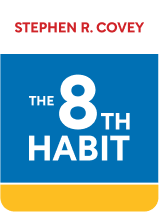

This article is an excerpt from the Shortform book guide to "The 8th Habit" by Stephen R. Covey. Shortform has the world's best summaries and analyses of books you should be reading.
Like this article? Sign up for a free trial here .
What is The 8th Habit by Stephen Covey about? What does Covey’s eighth habit entail?
In The 8th Habit: From Effectiveness to Greatness, Stephen Covey adds the eighth habit to the original seven described in his bestseller, The 7 Habits of Highly Effective People. Covey’s 8th habit is the habit of leadership, and it determines your unique contribution and helps others do the same.
Continue reading to get an overview of Covey’s The 8th Habit, split into three parts: The Individual, the Organization, and the Leader.
What is the 8th Habit?
According to Covey, the 8th habit ensures that great leaders work on themselves first, making sure they’re balanced, well-rounded human beings before they try to influence others.
The 8th Habit, published in 2004, marked a shift in Covey’s focus from the individual level to the bigger picture of organizations and leadership. Covey argues that to meet the needs of modern staff in contemporary workplaces, leaders need to revolutionize the way they lead. Instead of focusing primarily on processes and products, the best leaders of the future will focus on individual people, and on helping them fulfill their potential by identifying their “voice”—their unique contributions—and sharing them with the world.
Covey’s concept of “voice” encompasses all parts of the human being (body, mind, heart, and spirit). He examines how to identify this unique contribution at several levels: as individuals (Part 1); organizations (Part 2); and leaders, who serve as the bridge between individuals and organizations (Part 3).
What Does Covey Mean by “Voice”?
Your voice, according to Covey, is your unique personal contribution. It’s the point where your gifts, your passion, and your moral compass overlap. Identifying and sharing this contribution is your chance to move from treading water to swimming strongly in your personal and professional life. Moving forward, we’ll refer to Covey’s idea of “voice” as “contribution.”
(Shortform note: Covey’s concept of “voice” echoes the Japanese concept of ikigai. Your ikigai, or life purpose, sits at the intersection of your talents, your passions, what the world needs, and what you can be paid to do.)
Covey comments that children contribute freely and confidently—they do what they love, they work together and share with others, and they speak up when they don’t like something. As we grow, however, oppressive or overly competitive systems at school (and later at work) squelch our individuality and stifle our expression.
Part 1: The Individual
Covey first explores how to apply the 8th habit on an individual level. He suggests that we replace old work paradigms with a “whole-person paradigm.” Under this paradigm, people aren’t only bodies (as in the Industrial Age) or only minds (as in the Information Age). Instead, they’re complete individuals with physical, mental, emotional, and spiritual needs.
Covey sees individuals as made up of four parts. Healthy people consciously develop the capacities of all four parts, and their contribution springs from the unique way in which they combine and express them. Each of the parts corresponds with a basic human need, as well as with a specific type of intelligence:
- The body is associated with our need for survival. Covey calls body-based intelligence “discipline”—we’ll call it “self-control.” Self-control is the ability to see things as they really are and to work to bring goals and ideas to fruition, rather than building castles in the air.
- The mind is associated with our need for learning. Covey calls mental intelligence “vision”—we’ll call it “focus.” Focus is considering as many options as possible and synthesizing these options into a small number of high-quality solutions.
- The heart is associated with our need for connection. Covey calls emotional intelligence “passion”—we’ll call it “dedication.” Dedication is what drives you to exercise self-control and maintain focus in the service of a larger goal.
- The spirit is associated with our need to give back. Covey calls spiritual intelligence “conscience”—we’ll call it “integrity.” Integrity refers to your ethical principles and your ability to differentiate right from wrong in complex situations.
Part 2: The Organization
Next, Covey addresses how organizations can use the 8th habit to thrive. He sees organizations as consisting of four main components that align with the individual’s body, mind, heart, and spirit.
The 4 Components of Organizations
Covey maps his model of individual human beings onto organizations as follows:
- The body of an organization consists of its physical and economic components: its buildings and physical environments, cash inflows and outflows, raw materials, and products.
- The mind of an organization is its ability to strategize and set a path for the future.
- The heart of an organization is the people and human relationships within it.
- The spirit of an organization is its moral compass and internal accountability structures, including its mission and the way it allocates responsibilities across teams and individuals.
By looking at each of these components separately, Covey says we can diagnose and treat many of the common problems that organizations face. For example, a lack of enthusiasm and emotional investment from employees is caused by neglecting the heart of the organization and can be remedied through empowering leadership (the role of The Advocate, below). The lack of a mission statement—or, conversely, having an overly idealistic or hollow mission statement—is caused by neglecting the mind of the organization and can be remedied by assuming the leadership role of The Navigator.
Part 3: The Leader
Finally, Covey focuses on how the 8th habit applies to leaders, who serve as the bridge between individuals and organizations. According to Covey, leaders in the Age of Wisdom should focus on cultivating self-control, focus, dedication, and integrity within their organizations. Instead of issuing orders from above, they should encourage team members to develop these four intelligences within themselves, thereby nurturing the team members’ own unique contributions.

———End of Preview———
Like what you just read? Read the rest of the world's best book summary and analysis of Stephen R. Covey's "The 8th Habit" at Shortform .
Here's what you'll find in our full The 8th Habit summary :
- Why the most important job of a leader is to nurture individuality
- How an organization is like the human body
- Why leaders should let their employees evaluate them






